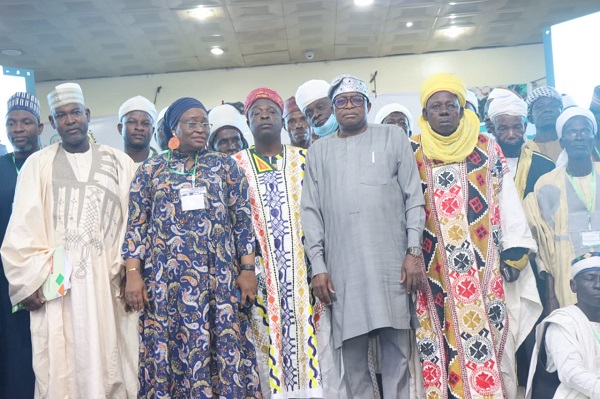
The Nigeria chapter of the Open Forum on Agricultural Biotechnology (OFAB), under the auspices of the National Biotechnology Development Agency (NABDA) today (June 27, 2022) engaged thought leaders in the Federal Capital Territory (FCT), Abuja, on adoption of agricultural biotechnology to enhance productivity and food security.
The one-day sensitisation workshop convened in collaboration with the African Agricultural Technology Foundation (AATF), Programme for Biosafety Systems (PBS) and the Agricultural Research Council of Nigeria (ARCN) was themed “Community empowerment through agricultural biotechnology: Roles of farmers traditional rulers, religious clerics and extension agents”.
In his welcome address, the director-general, NABDA, Prof. Abdullahi Mustapha, said participants were invited to be sensitised on the latest innovation Nigeria has embraced in providing affordable, safe and nutrient-rich food to the populace.
He said biotechnology and its tools have proven to provide spot-on solutions for most of the challenges facing agricultural productivity, adding that with biotechnology, Nigeria can undertake precision agriculture that brings about increased yields, safe and clean harvest.
Represented by the country coordinator, OFAB Nigeria chapter, Dr. Rose Gidado, Mustapha assured that NABDA will continue to introduce and establish innovations that will make agriculture a thing of joy to the old generation and an attraction for the younger ones. He expressed the hope that participants will embrace the cutting-edge technology and its inherent benefits going forward.
In his goodwill message, the executive secretary, ARCN, Prof. Garba Sharubutu, said the theme of the workshop ‘Empowerment of community through agricultural biotechnology,’ showed that the council has a vital role to play to achieve it.
Represented by the director of extension and socioeconomic department, Prof. Bello Abubakar, Sharubutu averred that extension is a core activity of ARCN which is part of her responsibility to showcase the technologies generated from the National Agricultural Research System (NARS).
Addressing farmers, the national president of the All Farmers Association of Nigeria (AFAN), Arch. Kabir Ibrahim, assured farmers on the safety of genetically modified crops, saying it is the only way out of poverty for farmers who can plant and get more produce on the same parcel of land.
“The farmers will spend less on insecticides and labour, thereby mitigating losses due to insect infestation, especially the dreaded pod-borer which is known wipe out about 75 per cent to, sometimes, 100 per cent of cowpea plantation. I can testify to the efficacy of the PBR cowpea because I have planted it and sprayed insecticide only twice instead of 8 to 10 times. The yield is also quite remarkable. The Bt cotton is also resistant to insects and drought with an enhanced yield,” he added.
Ibrahim contended that the fear of GM as expressed by the Anti-GMO activists is not supported by good science, adding that GM crops undergo many tests and regulations by the biosafety agency before being certified safe for planting or consumption
“I implore our farmers, monarchs, clerics and extension workers to champion the advocacy to embrace biotechnology. This ennobles the commercialisation of GM crops and poses as the game-changer in our quest for the attainment of food sufficiency and exit from poverty as a nation. Our farmers will exit subsistence farming through planting PBR cowpea and Bt cotton and several other crops that will be released shortly,” he added.
Speaking on behalf of traditional rulers, the Sarkin Bwari, HRH Alhaji Auwal Musa Ijakoro, represented by the Sarkin Hausawa of Bwari, Mallam Dantani Dantsoho, commended OFAB/NABDA for working with farmers to improve the seedlings and, as a result, their food production.
He expressed the hope that farmers will take good advantage of the workshop to learn all they can about agricultural biotechnology so they can utilise GM crops to improve their produce, expressing the hope that FCT farmers will not only feed the federal capital but the nation at large.
In his remarks, the country coordinator, PBS, Nigeria, Dr. Matthew Dore, congratulated the workshop organisers, saying the selection of clerics, traditional rulers and rural farmers to partake in the workshop is spot- on.
He further said that the focus on two crops only gives opportunity to share critical information about the confirmed safety of these crops that have value for industry and food, adding the crops also lend themselves to employing large numbers of rural poor.


